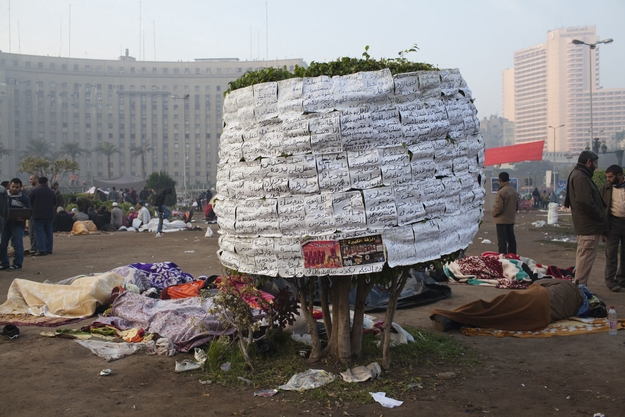Beugnies woont en werkt sinds 2008 in Caïro. Nog voordat er sprake was van een 'revolutie', fotografeerde zij al Egyptische jongeren die elkaar opzochten in kleinschalige protestbijeenkomsten. Door het persoonlijk contact met haar leeftijdsgenoten belicht ze de revolutie vanuit een andere invalshoek dan de reguliere media. Deze foto's worden nu voor het eerst geëxposeerd.
Met haar serie The Revolution Continues biedt Beugnies een genuanceerde blik op het leven van demonstranten uit verschillende lagen van de bevolking. In de serie Tahrir Love Stories portretteert ze stelletjes bij wie de liefde is opgebloeid tijdens de demonstraties. De foto's laten zien hoe uit de puinhopen van de revolutie toch iets moois kan voortkomen. De serie Muslim Sisters of Egypt toont jonge, strenggelovige vrouwen die zich sterk maken voor een islamitische staat én voor meer rechten voor de vrouw. Onder hun sluiers dragen ze merkkleding en ze dromen van een carrière als televisiester.
Op vrijdag 20 april opent de expositie met een talkshow over kunst, politiek en social media onder leiding van Ernst-Jan Pfauth. Een belangrijk thema tijdens deze talkshow is de zogenaamde 2.0 revolutie. Was de rol van Facebook en Twitter wel zo doorslaggevend voor de revolutie?
Pauline Beugnies (Charleroi, 1982) is lid van Out of Focus, een collectief van jonge Belgische documentaire fotografen die zich richten op langdurende projecten om sociale kwesties in beeld te brengen. Beugnies: 'Ik denk dat foto's kunnen bijdragen aan verandering, in ieder geval door dienst te doen als symbool.' Eerdere projecten voerden haar naar Congo, Bangladesh en Albanië. Haar werk is onder meer gepubliceerd in De Morgen, Le Monde, The New York Times en The Guardian.
www.paulinebeugnies.com
---English---
De Brakke Grond presents photographs made by Belgian documentary photographer Pauline Beugnies (1982) before, during and after the Egyptian Revolution. Revolution of the Youth shows, in an intimate way, the consequences of this great change in the personal lives of young Egyptians.
Beugnies has lived and worked in Cairo since 2008. She started photographing young Egyptians joining together in small-scale protests well before anyone was talking about 'revolution'. Through this personal contact with people of her own age, she is able to expose the revolution from a perspective different from that offered by the mainstream media. This exhibition is the first time these photos have been shown.
In the series The Revolution Continues, Beugnies gives a subtle insight into the lives of demonstrators from different social classes. The series Tahrir Love Stories portrays couples for whom love blossomed during these demonstrations. The photos show how something beautiful can emerge from the trauma of revolution. In the series Muslim Sisters of Egypt she shows young, orthodox Muslim women campaigning for an Islamic state, as well as for more rights for women. Under their veils, they wear designer clothes and dream of careers as a TV star.
On Friday, 20 April, the exhibition will open with a talkshow on art, politics and social media chaired by Ernst-Jan Pfauth. One important theme of this talkshow will be ‘revolution 2.0.’ Was the influence of Facebook and Twitter really so decisive in the outcome of the revolution?
Pauline Beugnies (Charleroi, 1982) is a member of Out of Focus, a collective of young Belgian documentary photographers involved in long-term projects aimed at exploring social issues. Beugnies: 'I believe that photos can contribute to change; in any event by acting as symbols.' Previous projects took her to the Congo, Bangladesh and Albania. Her work has been published in De Morgen, Le Monde, The New York Times and The Guardian.
www.paulinebeugnies.com
